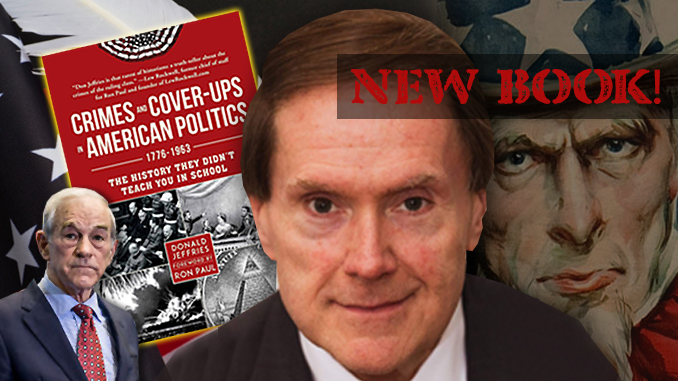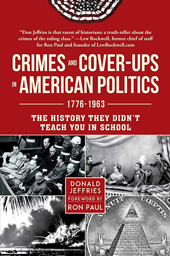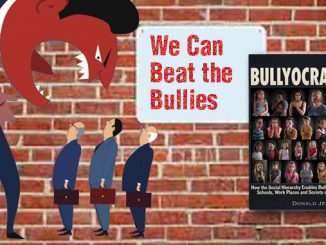
Donald Jeffries reveals “the history they didn’t teach you in school,” revealing the dark side of U.S. politics in his must-read new book.
By the AFP Staff
The explosive new book Crimes and Cover-Ups in American Politics: 1776-1963—The History They Didn’t Teach You in School, which features a foreword from Ron Paul, tears the lid off two centuries’ worth of lies by the state-controlled court historians. In the words of the great George Orwell: “Who controls the past controls the future. Who controls the present controls the past.”
Few Americans realize how far-removed our present-day leaders are philosophically from the founding fathers and the system of government they carefully devised. Once-revered figures like Thomas Jefferson have been slandered and branded “racist” by virtue-signaling mainstream journalists and arrogant college professors.

In his new book, Crimes and Cover-Ups in American Politics: 1776-1963, AFP writer Donald Jeffries takes an in-depth look at numerous subjects spanning two centuries of U.S. history. These topics include, for instance, evidence showing DNA tests that allegedly established Thomas Jefferson fathered the children of his slave Sally Hemings were less than complete. In fact, they merely demonstrated that a male from the Jefferson family—with over 20 potential candidates—probably fathered one of Hemings’s children. While the author of the Declaration of Independence continues to be slurred as a “child molester” and “rapist,” the DNA tests actually proved that he could not have fathered the child who was born to Hemings when she was underage.
Jeffries also writes that Hollywood has never made a film, even in its early, patriotic days, about the life of George Washington. Or Benjamin Franklin. Or Thomas Jefferson. Or Patrick Henry. The only founding father who was given his own film was the bankers’ favorite, and the father of debt, Alexander Hamilton. While the other founders are dismissed now as “dead white men,” Hamilton has experienced a rebirth on Broadway as a hip, young black man. The entertainment industry does not want to focus on the circumstances surrounding the birth of this republic and all that radical talk about overthrowing tyranny, taxation without representation, and the right of people everywhere to have a government they consent to.
Readers will learn how the concept of consent of the governed was shattered forever by Abraham Lincoln during the War Between the States. Crimes and Cover-Ups exposes the dark side of Lincoln, revealing him to be a constitutional usurper, the first imperial president, and the greatest tyrant in the history of this country.
Lincoln locked up an unknown number of civilians in the North for their opposition to the war or to his suspension of the writ of habeas corpus. One of those imprisoned was Frank Key Howard, grandson of Francis Scott Key. In a fantastic historical irony, Howard was jailed in Fort McHenry, the same fort over which the majestic flag was flying when his grandfather described it in “The Star-Spangled Banner.” Lincoln also shut down more than 300 newspapers that dared to question his authority. He was even going to arrest the chief justice of the Supreme Court, who ruled that his suspension of the writ was unconstitutional, but his aides talked him out of it.
While Lincoln forever altered the balance of powers with his overreach, readers should come to understand that his assassination was the result of an “inside job,” orchestrated almost certainly by his mentally unstable secretary of war, Edwin Stanton. William T. Sherman, Philip Sheridan, Ulysses S. Grant, and other northern generals are exposed for what they were—bloodthirsty thugs who trampled upon the time-honored protocols of warfare. Under Lincoln, the “scorched earth” policy of Sherman and his cohorts resulted in the wholesale burning of houses and crops, destruction of land, organized plunder and theft, and unfettered rape of women, especially slave women. Readers will see Reconstruction for what it was—a military occupation of the South, with total subjugation of the remaining populace, which eventually resulted in the birth of the Ku Klux Klan, Jim Crow laws, and a century of “separate but equal” society.
Other topics Jeffries explores include:
- Questions surrounding the assassinations of Presidents Garfield and McKinley;
- The false-flag “Remember the Maine” incident, which ushered in America’s first foray into truly international conflict, contradicting the isolationist, common-sense advice in George Washington’s “Farewell Address”;
- World War I and the inexcusable, incomprehensible bloodbath it represented;
- The great Gen. Smedley Butler, whose little book War Is a Racket still resonates today;
- President Woodrow Wilson’s unconstitutional acts, made possible by the awful precedents set by Lincoln;
- The Treaty of Versailles, which set onerous restrictions on Germany, created payments of reparations to the victors that didn’t stop until 2010, and made World War II inevitable;
- Adolf Hitler’s rise to power, which was not accidental, as was documented in Antony Sutton’s classic book Wall Street and the Rise of Hitler;
- The stock market collapse and the Great Depression, which were created by the same bankers who became so empowered by the creation of the Federal Reserve System;
- The Lindbergh baby kidnapping—Bruno Richard Hauptmann, an innocent victim of circumstances and of burgeoning anti-German prejudice, whose execution was state-sanctioned murder.
- More specifically, when it comes to the era of World War II, readers will learn that President Franklin D. Roosevelt’s reign of terror was second only to Lincoln’s, as he trampled upon the Constitution with impunity, with the lowlight being his largely forgotten Supreme Court “packing” scheme.
Roosevelt, like Wilson, his cousin Teddy, high-profile lawyer Clarence Darrow, and other leading “liberals” of the era had all been passionately in support of World War I (unlike genuine classical liberals and populists like William Jennings Bryan, Huey Long, and Smedley Butler) and were lusting for World War II. This book presents voluminous evidence that FDR and other high-ranking government officials were desperate to get into the new European war and engineered the “sneak” attack by the Japanese at Pearl Harbor. And then there were the atrocities committed by the “good guy” Allies, including widespread reports of rape.
- The bombing of Dresden, one of the most beautiful and historic cities in the world, which held no military importance whatsoever, was a “war crime” if ever there was such a thing. One of the last great American writers, Kurt Vonnegut, was inspired by the carnage at Dresden to write the classic novel Slaughterhouse Five about his experiences.
- The Nuremberg Trials have become accepted as the ultimate “justice” by everyone across the political spectrum. Readers will learn, however, that there was great criticism of the trials at the time, especially from true liberals. Supreme Court Justice William O. Douglas and Sen. Robert Taft were two of the leading voices of opposition. Then-Senator John F. Kennedy used Taft’s opposition to the Nuremberg Trials as one of the chapters in his best-selling book Profiles in Courage. Young Kennedy himself left some choice critical comments on the record about this new brand of “justice.”
- A precedent for this had been set after the Civil War, when a federal government bent on vengeance executed Henry Wirz, the commander of the Andersonville Prison—Camp Sumter—in the South for the deaths of thousands of Union prisoners of war, even though it was impossible to feed northern prisoners adequately when food was scarce even for the southerners themselves. Few Americans know that the South tried repeatedly to prod Grant and others to swap prisoners, because they knew they couldn’t feed them. The South grew so desperate that they offered to release their prisoners without getting any back in return but were refused by the North. An actual attempt to drop northern prisoners off into the custody of northern officials in Florida was turned away at gunpoint.
- Punishing the losers in a war legally, and even with a death sentence, was not an entirely new thing in American history. While some Nazis were executed, and peace advocate Rudolph Hess became the solitary prisoner for decades at Spandau Prison, others were welcomed warmly into America under the CIA’s “Operation Paperclip” program, whereby some helped establish the space program.
- Jeffries also examines the first and only congressional investigation into tax-free foundations, along with the impressions of Norman Dodd, chief investigator in 1953 for the Select Committee to Investigate Tax-Exempt Foundations and Comparable Organizations.
- A century’s worth of hideous experiments performed on mental patients, prisoners, orphans, and soldiers, and impoverished communities are documented. Brainwashing and Manchurian candidate-style research conducted by the CIA are revealed, along with the hideous spraying of poisons and diseases unto whole American communities by the military.
- Finally, the crusade to establish a one world government, from Wilson’s dream of the League of Nations, to the birth of the United Nations, is chronicled.
Crimes and Cover-Ups in American Politics: 1776-1963 reminds the reader, over and over again, that history is written by the victors. History is also, as Napoleon Bonaparte said, merely a fable that is agreed upon. The court historians have distorted the record so thoroughly that most of the “heroes” it touts were genuine “bad guys,” and those labeled as villains were often the “good guys.” Lifelong warmongers like Teddy Roosevelt, Woodrow Wilson, Franklin Roosevelt, and other leading “liberals” of each age are portrayed as voices for peace and reason. A good American like Henry Ford, meanwhile, who was a genuine pacifist, is denigrated as a cranky anti-Semite.
Most Americans have little interest in history, and a large number are historically illiterate. This book can help educate them.

TABLE OF CONTENTS
Foreword by Dr. Ron Paul
The Birth of the Republic
The slandering of Jefferson, sacrifices of the Founders, Benjamin Franklin’s Hellfire Club association and later discovery of human bones in his London home, Thomas Paine, the Shays and Whiskey Rebellions, Adam Weishaupt and the Illuminati, our revolutionary legacy
Pre-1860: Jacksonian Democracy
Meriwether Lewis—murdered or suicide, the War of 1812, Freemasons and Anti-Masons, Andrew Jackson—foe of bankers and first president to experience an assassination attempt, Remember the Alamo, the Mexican-American War, John Brown’s true nature
Honest Abe Lincoln
Clement Vallandigham, the invention of total war, Lincoln the racist, Lincoln the warmonger, Lincoln the atheist, Lincoln’s true legacy
The Lincoln Assassination
The “trial” of the conspirators and a weighing of the evidence against them
Post-Civil War America
The horrors of Reconstruction, the 1876 election, the Garfield assassination, Reconstruction fallout, the Populists, the lies and myths of the Spanish-American War
The 1900-1920s
The McKinley Assassination, Bully for Teddy Roosevelt, the 1913 Federal Reserve Act, cowboys and Indians, anti-union violence, World War I, the strange death of President Warren Harding, Prohibition, Sacco and Vanzetti
The Depressing 1930s
The Bonus Army, the Lindbergh kidnapping, documenting the legal lynching of Bruno Richard Hauptmann
FDR Channels Lincoln
The false flag of Pearl Harbor, Jeannette Rankin, crushing domestic dissent, Benito Mussolini, Allied war atrocities
Post-War America
The alleged suicide of Hitler, more allied atrocities, Glenn Miller, the execution of Eddie Slovik, the disgraceful Nuremberg Trials, Truman drops the bomb, the creation of Israel, Robert Taft, War is a Racket, the cancer explosion/ vaccinations/ government experimentation on prisoners, orphans and entire populations
The Fabulous Fifties
Sen. Joseph McCarthy, The Central Intelligence Agency, Korean War, The Reece Committee to Investigate Tax-Free Foundations, The Rosenbergs, The true cost of communism, World government
Secular ‘Saints’ and Sacred Cows Gored!
For far too long, American history has been left in the unreliable hands of those that author Donald Jeffries refers to as the court historians. Crimes and Cover-ups in American Politics: 1776-1963 fights back by scrutinizing the accepted history of everything from the American War of Independence to the establishment reputation of Thomas Jefferson and the other Founding Fathers, the Civil War, the Lincoln assassination, both World Wars, U.S. government experimentation on prisoners, mental patients, innocent children and whole populated areas, the Lindbergh baby kidnapping and much, much more. Secular saints like Abraham Lincoln, Theodore Roosevelt, and Franklin D. Roosevelt are examined in a critical way they seldom have been. This is a book all AFP supporters should read!

